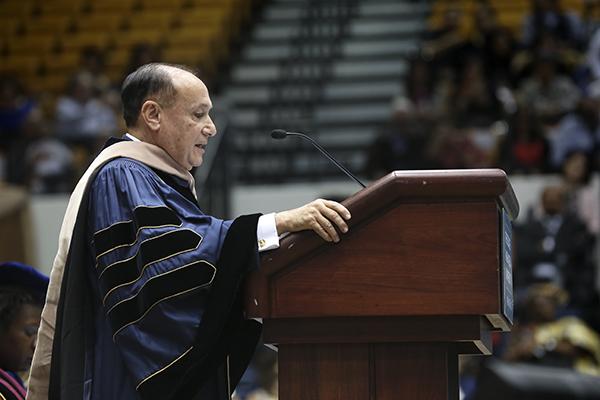Students don’t have to wait for their next internship to get a taste of what it’s like to work after graduation.
For the first time, professors can now apply to receive funding from the Center for Career Services, a program created following trustee Mark Shenkman’s $5 million gift last spring. The program allows faculty members across schools to compete for grants that help to integrate career opportunities into their courses, which they say can better understand what jobs are out there and prepare for them. Projects gave students hands-on experiences in prospective future careers.
The grants, which can total a maximum of $2,000, can be awarded to any faculty or staff member who proposes professional and career development activities for undergraduate and graduate students.
Dean of Student Affairs Peter Konwerski said the grant is just one way the University has “operationalized” Shenkman’s gift.
“The faculty are getting some funding to support the actual courses or students’ particular majors, and we’re doing something that any student can participate in,” Konwerski said. “Incentives and programs like this make it easier for students to participate.”
Other programs have rolled out across campus since the University began overhauling career services in 2012 and have increased exponentially since the arrival of Shenkman’s donation. Earlier this year, 43 juniors and seniors traveled to New York for the first-ever Career Quest, which put them in touch with potential employers. Shenkman’s gift has also helped to fund programs connecting student veterans to career opportunities.
Rachel Brown, the assistant provost for University career services, said the gift has allowed students to stretch their networking and career opportunities.
“The grants help broaden our reach and enhance opportunities for GW students,” Brown said in an email. “It is exciting to have the opportunity to expand career and professional development programming in this creative way.”
Faculty’s applications to receive funding next semester were due earlier this month and recipients will be notified in early June. Some projects were more traditional networking events, while others provided different types of hands-on experiences for students in their desired fields.
Joanna Spear, an associate professor in the Elliott School of International Affairs, noticed fewer female students in her security policy courses who were actually interested in careers in international security. This spring, she showed female students firsthand that a career in security is possible.
Using Shenkman grant money, Spear hosted three events over the past few months, including a panel discussion and a networking session with prominent women in international security to encourage female students to consider pursuing jobs in the field.
“Some of my own students said it was empowering and helpful to hear about other women’s experiences,” she said. “I want to provide them with as many opportunities as possible to talk about these careers, they need to do some planning to get them.”
Spear said it was “inspiring” to see her students connecting with people with careers they could envision themselves having one day.
“It’s really nice that there was this opportunity because it’s something I wouldn’t have the resources or bandwidth to do otherwise,” Spear said.
Ethel Badawi, an associate professor of paralegal studies in the College of Professional Studies, used her grant to create a competition for students in the program to improve their LinkedIn profiles, called “LinkedIn, Linked Up.”
Students followed guidelines for good digital networking profiles and got feedback from panels of professionals in their desired fields. Winners got a chance to meet people with their dream jobs in areas of the country where they were interested in living.
Badawi said this was a particularly useful opportunity to teach students how to optimize online resources to land jobs through LinkedIn, and making sure students’ online personas were professional.
“Our goal was to get students to start thinking about employers and recruiters being online, and we are seeing that,” Badawi said.
Badawi said incorporating career opportunities into courses can help students trying to land jobs after graduation. And because faculty do not always have recent job experience in the subjects they teach, this gives students a chance to connect with those who might have more relevant experiences.
“They tend to teach their expertise to students in an academic setting, and they don’t always connect them with the practicality required in the workforce,” Badawi said.
Individual schools’ career services offices are also working with career services to encourage faculty to apply for grants and create programs for them.
Derek Haseltine, the director of career services in CPS, said he worked with Badawi to design a plan for their students that could easily translate to other GW schools.
“We wanted to make sure we were making an impact and creating something that could be replicated, something that would be a good model in other career services offices,” Haseltine said.







